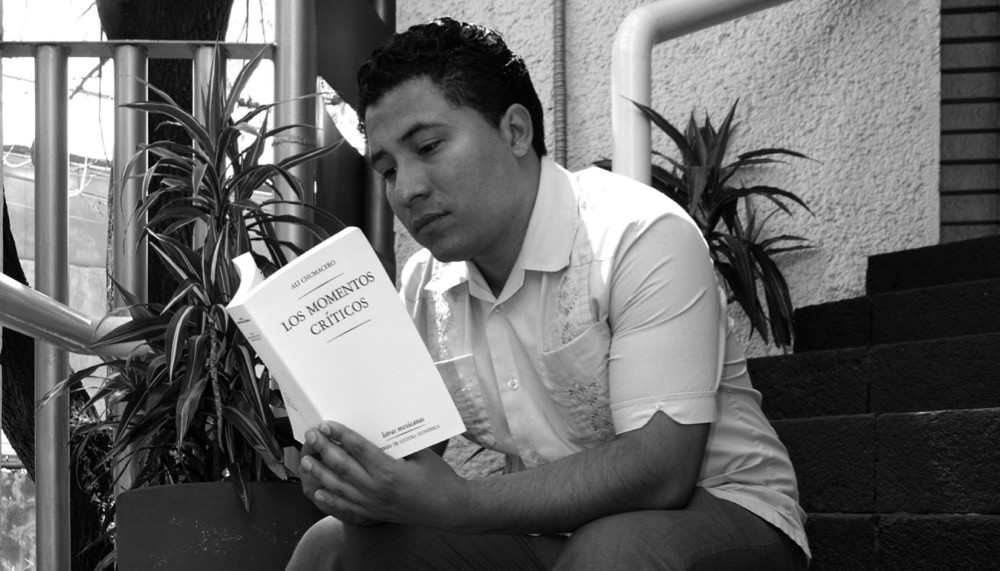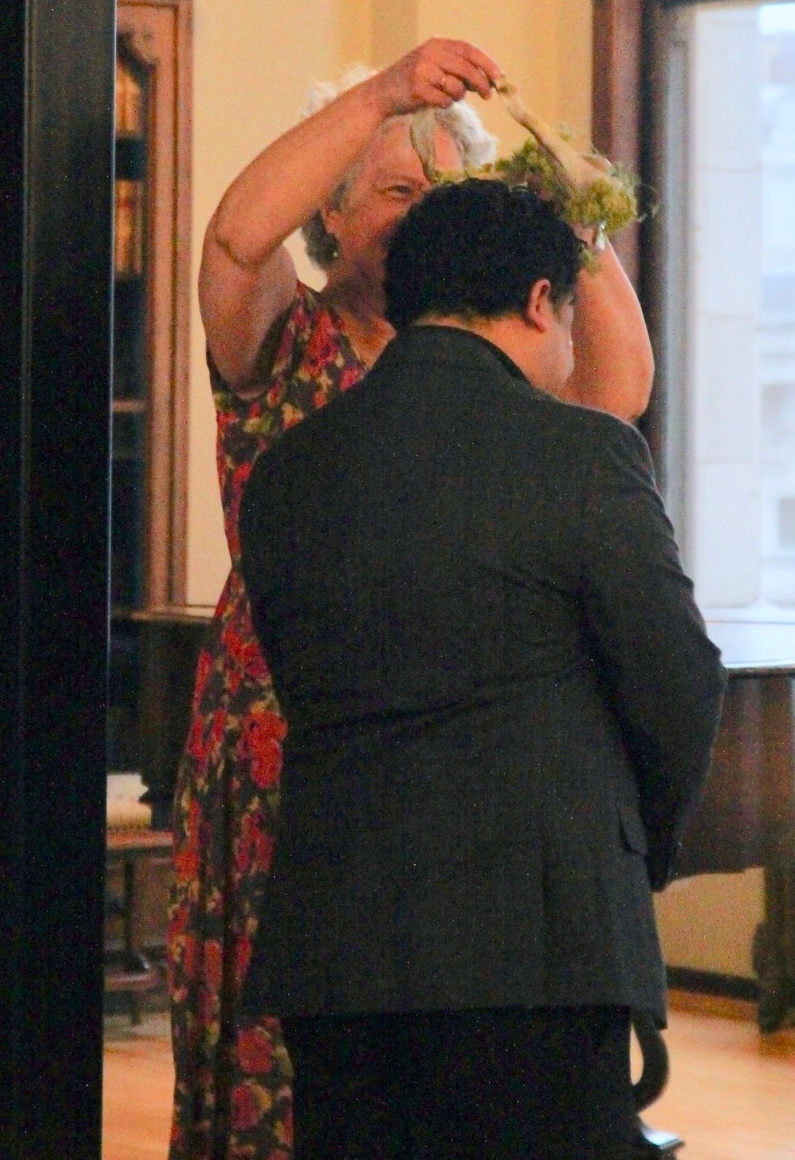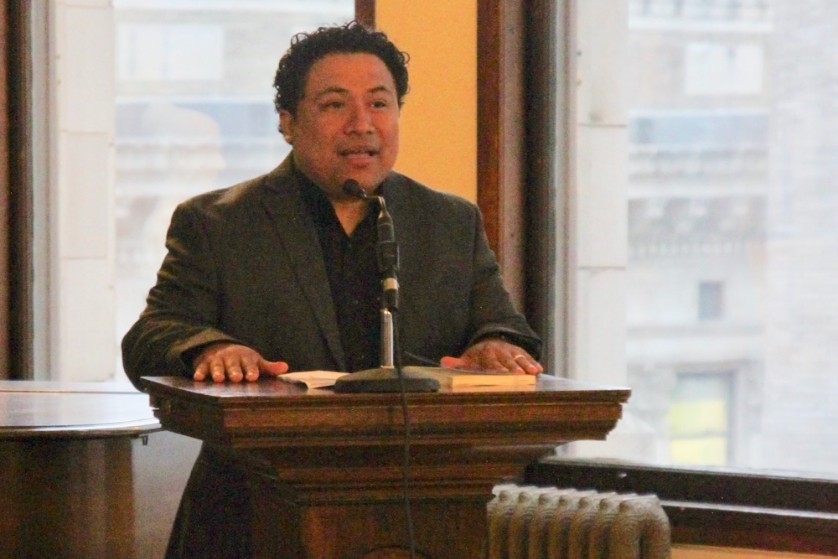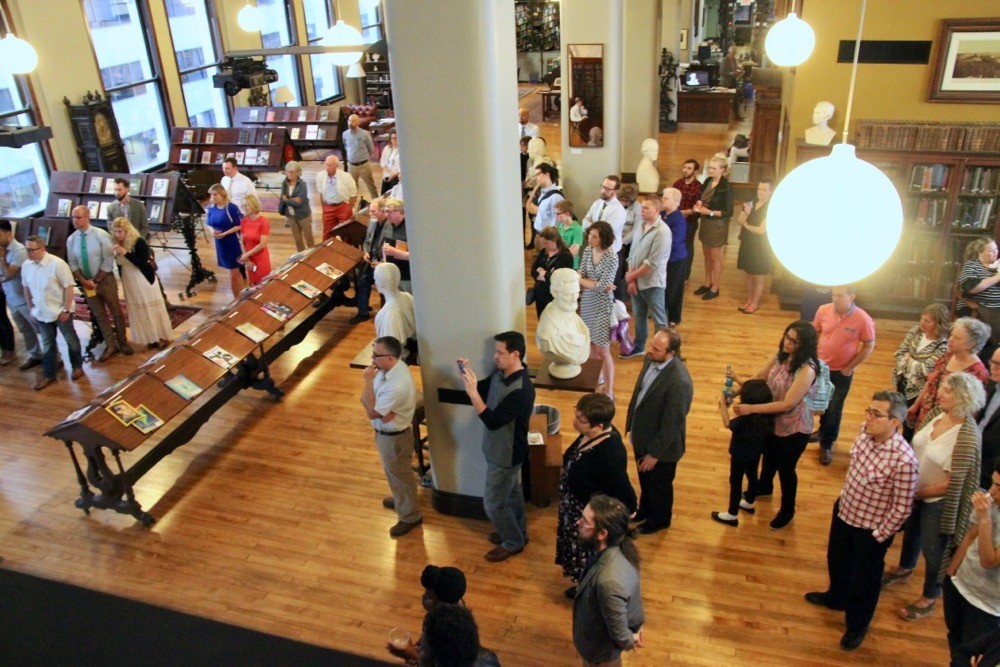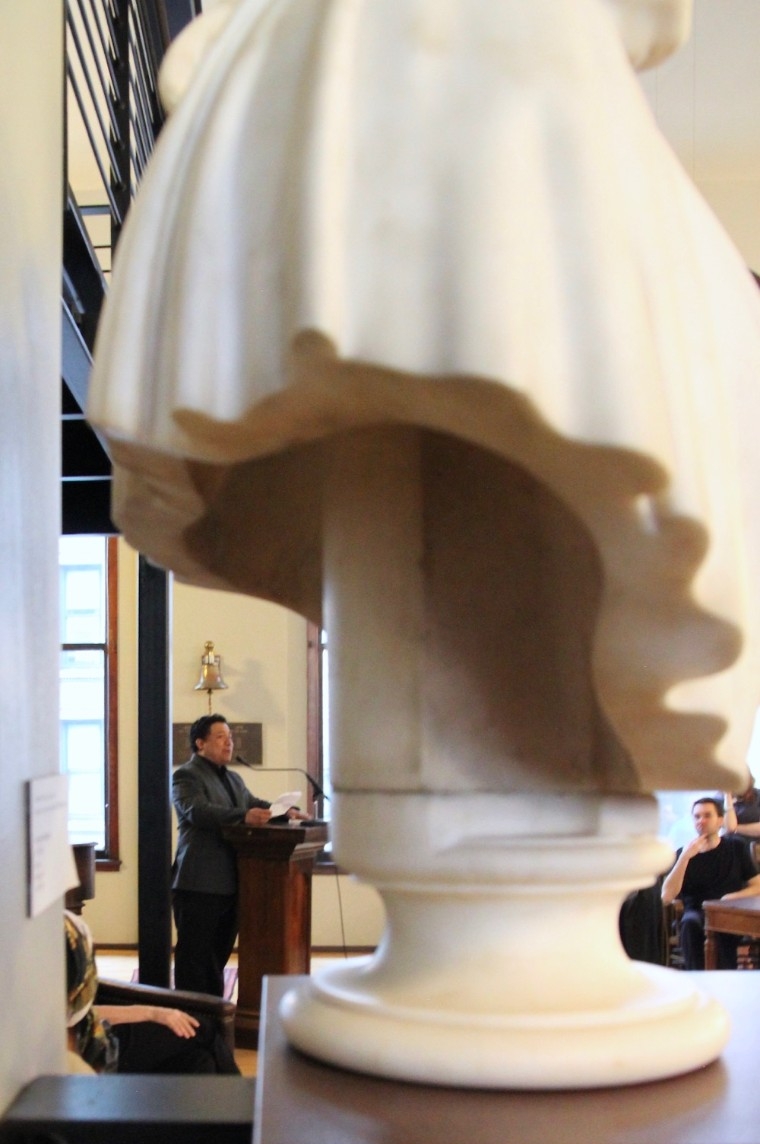Universtity of Cincinnati romance languages alumnus Manuel Iris, appointed as Cincinnati's second Poet Laureate by Mayor John Cranley, will serve for two years.
A passion for words
UC alum Manuel Iris, co-coach of the city’s first-place poetry team and author of six published books of poetry, is appointed by the city’s mayor as Cincinnati’s second poet laureate.
by Melanie Schefft
513-556-5219
Photos/provided
May 15, 2018
As a young child in Mexico barely able to read, Manuel Iris picked up a dictionary and thought it was the most fascinating book in the world.
More than three decades later, Iris used his affinity for words to garner his doctoral degree in Romance languages from the University of Cincinnati in 2013, published six books of poetry and was named as Cincinnati’s poet laureate.
Based on the recommendation of an advisory committee, Iris was selected for the honor by Cincinnati Mayor John Cranley in April to serve for two years.
Amid Cincinnati's Mercantile Library’s marble statuary and old-world charm, a crowd of more than 100 poetry lovers wished Iris well as Pauletta Hansel, Cincinnati’s first poet laureate, passed the torch so-to-speak, but in the form of a laurel wreath she affectionately placed on his head.
Attending the ceremony in May were Cincinnati city council members, students and faculty from UC, poetry lovers and the loves of his life — his wife and three-week-old daughter, Olivia.
“This honor does not talk about the quality of my poetry but about the quality of the people in a city that has the beautiful soul to allow a poet who came from somewhere else to be its poet laureate,” he said while accepting the honor.
“These next two years will be a constant effort to give back all of the love this city has given me. The city where I met my wife and where three weeks ago my daughter was born.”
At the ceremony, Iris read from his favorite poems, pausing occasionally as he fought his emotions.
“I have seen young people asking questions that adults are too afraid to ask; I have talked to many English professors about literary subjects, and I have also helped homeless people write a part of their story. I am sure that every person has something to say,” Iris said.
“I believe that the first responsibility of the poet laureate in Cincinnati should be to find or create a platform for all those voices to be heard.”
According to appointment rules, to receive this honor, the poet laureate must have written poetry “that exemplifies the characteristics or spirit of Cincinnati.” During the two-year tenure, the honoree is expected to promote poetry appreciation and encourage the reading and writing of poetry throughout the city.
According to Carlos Gutierrez, UC professor and chair of the Department of Romance Languages, Iris has already successfully changed the lives of many in Cincinnati and noted the profound influence he has had on his students through his passion for the spoken word. Gutierrez also noted Iris' influence and his work in national and international anthologies, including:
- “For a Better World: Poems and Drawings of Peace and Justice”
- “The Portable Boog Reader 9: An Anthology of Cincinnati and New York Poetry”
At the Mercantile Library ceremony, Manuel Iris read from some of his published works to a crowd of Cincinnati poetry lovers including UC faculty, alums and many of his high school slam poetry students.
Finding the extraordinary in the ordinary
After graduating UC in 2013, Iris became an educator teaching Spanish part-time at Cincinnati’s DePaul Cristo Rey High School –– a private school in Clifton that he describes as “full of bright minds that needed a way to tell their stories.”
While his initial goal was to hold an academic position in a university, Iris says he was happy with the impact he was making on young minds at critical crossroads in their academic futures. Before long, the high school realized his gifts and offered him a full-time position teaching English and world literature.
Mentoring students at the school and helping coordinate their poetry club and the "Spoken Word" slam poetry team soon became a natural fit with his goals for helping teens put their feelings into words and rhythm.
“The kids in Spoken Word don’t have the obligation of both performing and writing,” Iris says. “They can do whichever they want –– some are 'page poets' who only write, while others are 'stage poets' who only perform, and of course there are those who do both.”
The same year he helped develop Spoken Word, the Louder Than a Bomb poetry slam contest came to Cincinnati coordinated by UC’s Taft Research Center and its then-director Adrian Parr.
Louder Than a Bomb slam poetry competition was coordinated by Adrian Parr, then-director of UC’s Taft Research Center. Terry Boling, associate professor in UC DAAP's School of Architecture, and his students received the Cincinnati Design Award and the 2016 Association of Collegiate Schools of Architecture Collaborative Practice Award for the video's MetroLAB design project.
A new voice
“Suddenly we had an actual objective, which was to practice for this event,” says Iris. “The first three years we competed we came in third and fourth place, but in the last two years we won first place back-to-back.”
Iris describes watching the group’s learning curve grow into a life-changing event for these kids.
“One of the reasons we are such a good team right now is because they have hung in there and are consistent. One of our kids who stayed in the club all four years of high school is now ready to graduate and go off to college,” Iris says proudly. “So when we go to competition we go with kids who have experience and know how it works.”
While the Louder Than a Bomb competition is nice, it is not what Iris cares the most about. He is most grateful for how it teaches the students to tell their stories, their most passionate fears and hopes.
“I always tell my students, ‘before you tell your story –– that thing, that event –– that moment still owns you,’” says Iris. “‘But as soon as you share your story through poetry, rap, hip-hop or song, you own that moment, you are in charge.’”
He is proud of the way poetry in all forms has taken on a new respect at the school, where the kids have created a rewarding culture, where they can read, write and perform their work.
“I believe in what we do at this school,” says Iris. “Many of these kids come from economic and life difficulties and were behind in their reading and writing skills. But after working with them, giving them a safe place, a platform to share their stories, they soon own their situation instead of the other way around.
“We give them an accessible private education and help them change their lives, and now 100 percent of our kids go to college.”
“I believe Manuel Iris is a young and brave poet who is not afraid of the challenge of the impossible, impregnating the page of the poem with beautiful verses that mark this search. They are ‘a collection of words in an unfinished dream,’ as he himself tells us. If the dream never ends, neither does the poetry.”
‒ Armando Romero, UC professor of Romance Languages and Literature, in his introductory to Iris’ recent published book, “Translating Silence”

Iris' new position as Cincinnati's second poet laureate was met with overwhelming enthusiasm from poetry lovers of all ages.
Pathway to a dream
At the tender age of 20, Iris published his first book of poetry while still an undergraduate in Merida, Yucatan. Since then, his prose has earned the 2009 Merida National Poetry Award for his book “Notebook of Dreams (Cuaderno de los suenos)” and Mexico’s Regional Award of Poetry Rodulfo Figueroa in 2014 for “Disguises of Fire (Los disfraces del fuego).”
Iris’ publications also include:
- “The Naked Light (La luz desnuda)” in Venezuela
- “Before the Mystery (Frente al misterio)” in El Salvador
- His most recent and first bilingual book “Translating Silence (Traducir el silencio)” was published this March in New York
After earning a Bachelor of Arts degree in Latin American literature from the Autonomous University of the Yucatan, Iris went on to receive a Master of Arts in Spanish from New Mexico State University. As a student in New Mexico, he had heard about the "creative charisma" of UC’s Romance languages creative writing program. At that time, these unique programs were a new trend popping up at American universities, and UC was one of three to offer the concentration.
“UC’s Romance Languages and Literature department had one of the newest, yet one of the most experienced creative writing programs of Spanish in the U.S. in 2009,” says Iris. “Our department’s creative prominence already included professors Armando Romero, Nicasio Urbina, Carlos Gutierrez and Maria Paz Moreno.”
“As a child, the dictionary became like a magical object for me, because absolutely everything was there with an explanation of what it was. Sometimes I competed with the book and tried to create a better description. I liked the idea of being able to say things. I didn’t know at the time that it was the beginning of writing; I thought it was just a game that I liked. That one book, the Spanish dictionary, became the key to changing my life.”
‒ Manuel Iris, who has never stopped writing since
Now adding his most recent mission as coordinator of Hispanic outreach at DePaul Cristo Rey, Iris serves as a link between the school and families of Hispanic students, as well as a link to the Hispanic community in Cincinnati.
“It is so important to me that, in the midst of everything that is happening in the national and political environment, it is a Hispanic poet who is receiving this honor as Cincinnati’s poet laureate,” says Iris. “It gives hope and shapes the image of Cincinnati as a generous, wonderful place.”
UC alum Manuel Iris helps embody the university's Next Lives Here strategic direction through academic excellence, urban impact and innovation through inclusive excellence.
Iris maintains an active literary blog at bufondedios.blogspot.com
Interested in Romance languages and creative writing? Check out UC’s Department of Romance Languages in the McMicken College of Arts and Sciences, and apply as an undergrad or graduate to become a Bearcat poet in the making.

